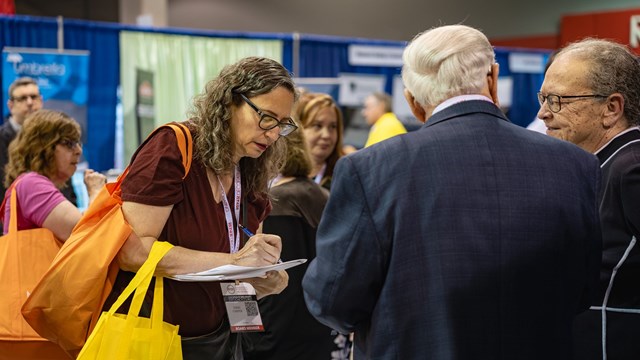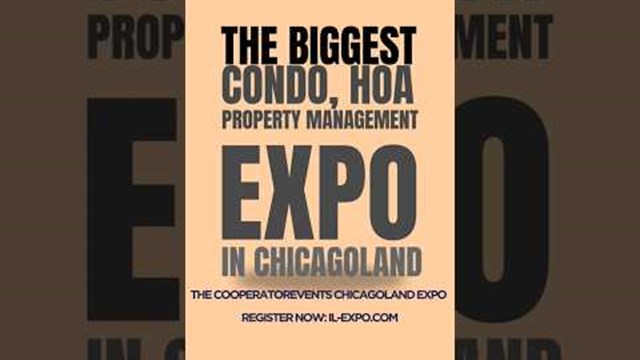Serving on the board of directors of a co-op, condo, or HOA can be a daunting undertaking, but there are numerous resources available to get new members up to speed and to inform seasoned members of the latest products, services, laws, and topics in the industry. Throughout the nation, whether you are new to your board or have been serving for years, you can find websites, publications, organizations, and events geared toward multifamily boards and the issues they face.
You’ve already come to the best place for news and insights about multifamily communities in your region—CooperatorNews Chicagoland, of course! In addition to the resources this publication provides in print, online, and at our popular CooperatorEvents Expos, there are other organizations and associations throughout the nation and beyond that give support and guidance to boards and homeowners in co-op, condo, and HOA communities.
Board-on-Board Onboarding
All community associations and cooperatives are unique. They have differing structures, populations, numbers of units, neighborhoods, histories, building materials, and budgets, just to name a few variables. The one thing they all have in common is that they are governed by a board of directors that, to borrow from Abraham Lincoln, is of the homeowners, by the homeowners, and for the homeowners—or more accurately, for the association or corporation as a whole.
It would stand to reason, then, that the best way to become familiar with board service in general—and service on a particular board more specifically—is to learn from a current or former board member of your condo or homeowners association or co-op corporation. Some boards even build that type of information exchange into a new board member orientation, or simply arrange more informal one-on-ones prior to the start of a new board term.
“Our board has a little bit of a tradition of having a current board member reach out to a newly elected one upon the vote certification,” says Karen W., a long-serving member of a co-op board in lower Manhattan. “They might then meet up for a coffee or lunch to talk about board roles and requirements, ongoing capital projects, meeting schedules, or what have you. The new member can discuss their goals or impetus for joining the board, and the veteran can explain how that might be accomplished—or not!” she adds with a chuckle.
Insider Information
Other boards tap their management company to provide or enhance orientation materials and processes. Michael Pesce, executive consultant at Associa Community Management Corporation of New Jersey, has been involved in such onboarding. “I’ve done the training for our newly elected boards personally, with the assistance of our community managers,” he says. “I’ll use a template outline that’s then customized for each of our managed communities.” The template includes sections on fiduciary obligations, legal governing documents, board responsibilities, insurance, and transitions. “The goal is to do more than just a typical review of responsibilities—it’s to provide a roadmap for new board members to know where their power comes from, and what constrains it.”
Where else can a group of volunteers who may or may not have individual knowledge or expertise related to residential properties find information and advice geared toward their particular building or community? Marc H. Schneider, managing partner of law firm Schneider Buchel LLP in New York, has some answers: “First of all, boards can turn to periodicals like CooperatorNews, which have frequent stories about topics of interest and import to the co-op and condo industry.” (Thanks for the shout out, Marc!) “Another place to seek resources is your professionals—there are reasons why there are professionals in the industry. Whether it’s a lawyer, an accountant, or an engineer, make sure you utilize your professionals. You [as a board member] are actually running a corporation, and like any corporation, when you make decisions, you should rely on and seek the advice of professionals.”
Marilyn Brainard is a member of the Community Associations Institute (CAI) Government & Public Affairs Committee. Reflecting on the 2020 condo collapse in Surfside, Florida, as well as more recent building failures with fatal consequences, she underscores how important it is for residential boards to hire qualified professionals, listen to their recommendations, and act upon them expeditiously.
“Board members—in all associations—are expected to use recognized experts to examine the integrity of the physical property as one of the most important responsibilities of a director, especially when lives may be involved,” she says. “This usually means hiring qualified business partners to report to the board and members of the association the soundness of structures providing housing. Not only [should boards] accept the report’s recommendations, but [they should] commence action for corrections in a timely manner.”
Outsourcing Resources
Speaking of CAI, there are many national and local organizations that provide a variety of resources for multifamily boards. CAI (www.caionline.org) is one of the largest, with 63 chapters worldwide and more than 40,000 members. They offer workshops, courses, trade shows, publications, events, and more—even the opportunity to earn a CAI Board Leader Certificate.
Raymond Dickey is the executive director of the Big Apple, Hudson Valley, and South Carolina chapters of the organization and president of Brainerd Communications, which publishes another resource: AssociationHelpNow™ (www.associationhelpnow.com), a blog and service directory geared toward co-ops, condos, and HOAs in Illinois, Michigan, Minnesota, New Jersey, New York, Ohio, Pennsylvania, and Wisconsin. He recommends that even well seasoned boards make use of professional resources and stay abreast of the latest developments affecting their communities.
Cheryl Murphy, executive director of CAI-Illinois, is of the same mindset. “It’s very important that a board continues to learn and understand what they’re doing with their investment in their association,” she says. “We offer a series of seven courses—we call it the ‘Dedicated Association Leader Series’—that includes things like meetings and elections, governing your association, the essentials of community association management, insurance, ethics, etc. A board member can take any one of those classes, if they’re interested in that particular topic, or they can take the entire series and then at the end of that they get the recognition of being a DCAL—or Dedicated Community Association Leader—which is important for them when going back to their associations and they can say, ‘Hey, I know what I’m doing, I know what I’m talking about, and I learned from a reputable resource.’ … If you have leaders making sound decisions based on best practices to make their community excellent, then their investment is going to be better in the long run.”
According to Scott D. Wolf, CEO of BRIGS, a real estate management firm with offices throughout New England, his firm provides new board members with CAI’s Board Member Toolkit, in addition to going over financials and walking the property as part of the board onboarding process. And, he adds, “we have several articles from over the years from New England Condominium magazine and Condo Media magazine,”—the official publication of CAI-NE—“which we have compiled and provide to both old and new board members on various subjects.” (We’ll take that shout-out, too!)
In addition to CAI, Dickey recommends connecting with organizations such as the Building Owners & Managers Association (BOMA), an international federation of local U.S. associations and global affiliates including in New York, New Jersey, Boston, Chicago, and Florida; and the Institute of Real Estate Management (IREM, www.irem.org), which provides courses, certifications, tools, publications, events, and advocacy in chapters throughout the U.S. and beyond.
The Community Associations Network (www.communityassociations.net) is an online resource that aggregates news and information related to co-ops, condos, and HOAs. There, boards and service professionals can access the latest on legislation, events, and issues pertaining to association living and governance throughout the U.S. and Canada.
The National Association of Housing Cooperatives (NAHC, www.coophousing.org) offers several opportunities for boards to become more educated and involved in the complexities of cooperative governance and operation, including seminars, conferences, publications, directories, and government action. Among its training resources is a six-hour board governance seminar called “The 3Rs for Cooperative Boards: Roles Risks & Rewards” that is designed for co-op boards to build cooperative knowledge and become better at working together as a board.
Some of the larger national property management firms also offer resources to boards both new and old through their websites and associated events that are available to the general public, not just buildings or communities they manage. FirstService Residential, for one, provides information on budgeting, communication, insurance, preventive maintenance, building community, and more in articles, videos, and webinars.
The Local Option
Regional organizations that focus on community association or cooperative issues more particular to a specific city or state abound as well. In areas like New York City, where multifamily community living dominates the housing landscape, homegrown organizations like the Presidents Co-op & Condo Council (PCCC) and the Coordinating Council of Cooperatives (CCC) were born out of the original concept of cooperatives exemplified in the Rochdale Principles, number 6 of which is “cooperation among cooperatives.” These organizations focus on sharing knowledge, information, and resources among the member co-ops; advocating for issues important to their stakeholders; and using their collective voice to effect change on a legislative level.
Gary Altman, president of CCC member co-op East River Housing Corporation, quips, “If knowledge is power, then those who regularly attend and learn from meetings of the Coordinating Council of Cooperatives must surely rank among the most powerful. More importantly, they are the best informed cooperators anywhere.”
In New York, larger local organizations provide information to board members on their websites, at their offices, or through seminars, courses, and conferences. Eric M. Goidel, Esq., senior partner at New York law firm Borah, Goldstein, Altschuler, Nahins & Goidel, P.C., cites the Federation of New York Housing Cooperatives (FNYHC), the Council of New York Cooperatives and Condominiums (CNYC) and the Office of the Attorney General as entities that provide educational and other resources to boards and board members. “But,” he continues, “I think the best thing to do as a board member is to not just read about [the issues], but actually do—but start with walking before you run.”
Ultimately, it is up to each board member to keep themselves informed and engaged regardless of how long they’ve been serving. The importance of staying up to date and really understanding the intricacies of an issue cannot be overstated. “Remember that this industry is constantly changing,” advises Dickey. “Laws change; new obstacles come up—such as ways associations deal with internet security or recent powerful storms. A standardized orientation is great, but the pursuit of knowledge should never stop.”
Darcey Gerstein is Associate Editor and a Staff Writer for CooperatorNews.










Leave a Comment